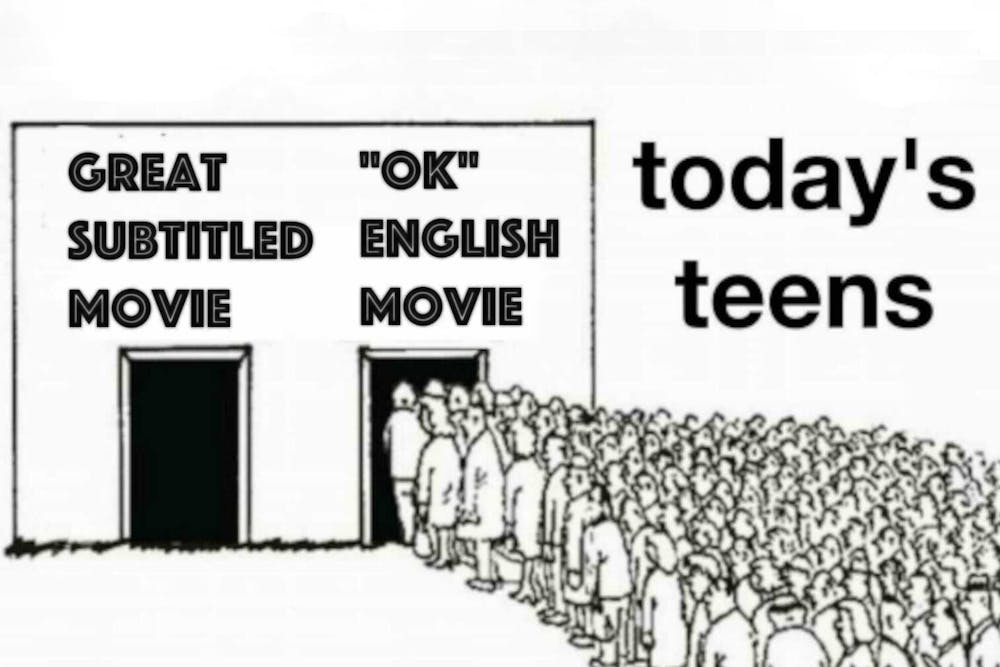When South Korean director Bong Joon-ho received a Golden Globe for his film "Parasite" in January 2020, he said "once you overcome the 1-inch tall barrier of subtitles, you will be introduced to so many more amazing films."
Now, nearly two years later, "Train to Busan," a 2016 South Korean film directed by Yeon Sang-ho, is being remade by Hollywood for an American audience.
The news was met with significant criticism across the internet, the primary response being that there is no reason for the movie to be made at all.
Most of the criticism has drawn from the same idea Bong made in his 2020 speech, saying that subtitles aren't something to be intimidated by.
Some students on campus echoed these critiques, saying subtitles open viewers up to so many unique and great films.
Averi Watson, a sophomore studying biomedical sciences, is one such student and said that reading subtitles isn't an inconvenience.
Growing up in a Thai household, Watson would watch a lot of Thai movies, despite not understanding the language well.
"You kind of just pick up what's going on," she said. "Especially if there's subtitles, it's really easy to follow along."
Ana Hedberg Olenina, an assistant professor of comparative literature and media studies who also studies international cinema, said that watching international films introduces audiences to diverse voices, unique world views, and different cultures that can be lost through Western adaptations.
"If people in the United States are just limiting themselves to watching American remakes, they are definitely losing out on a lot," she said.
It's natural for important themes to get lost in translation through remakes, but this comes at the expense of a director's intention for the film.
Olenina draws an example from the film "Solaris," a Soviet-era science fiction film that explores psychological and philosophical themes that were lost in the American version by the same name.
Typical to Western cinema, this includes an emphasis on a character's actions and their implications, which are generally driven by a certain goal, Olenina said.
Hollywood has a long history of Americanizing films, regardless of origin, from the Japanese film "Seven Samurai" being remade into "The Magnificent Seven," following the same story but set in the Wild West instead of feudal Japan.
"The Magnificent Seven" is a good movie in its own right, but is nigh unrecognizable as taking direct influences from "Seven Samurai," making it difficult to argue that the adaptation brought any new viewers to the original.
Olenina said storytelling and visuals can differ depending on the culture from which they originated.
American filmmakers generally cater to their audience through stories based on a single mission, whereas other countries may prefer to discuss philosophical themes and ambiguous psychological situations throughout their films, she said.
She specifically cited how Korean cinema explores darker, grotesque streaks that leave viewers unsettled compared to the easily digestible Hollywood formula.
In many cases, the original version of a film can be more dynamic and complex in its plot than its watered down counterpart.
For a movie like "Train to Busan," already incredibly successful in its own right, to get remade for the convenience of an English-speaking audience feels like a disservice to the amount of work put into the direction, acting and production of the film.
Despite not consuming much foreign content on her own, Alyana Dempsey, a sophomore studying biological sciences, thinks appreciating media and art from other cultures is good for people to expand their points of view.
When she does watch international TV shows, she feels that subtitles shouldn't be seen as a barrier since they make it much easier to understand the content, even if it is already in English.
Enjoying foreign media shouldn't be seen as a chore, especially in an age when films from any country are accessible on common streaming platforms and subtitle technology has become so advanced.
Remakes may be a well-intentioned attempt to introduce foreign films to a new audience, but come across as part of a trend that "goes along with the 'McDonaldization' of the world," Olenina said.
This isn't to say that American movies or remakes are inherently bad, but that international films come with so much depth and variety from their own distinctive backgrounds that can be lost in translation with adaptations.
But subtitles are the 1-inch golden ticket to a whole new world.
Reach the reporter at sbalas44@asu.edu and follow @sophiabala1101 on Twitter.
Like The State Press on Facebook and follow @statepress on Twitter.
Continue supporting student journalism and donate to The State Press today.

Sophia Balasubramanian currently serves as the Diversity Officer for the State Press. She previously worked on the Echo as an editor and reporter.




